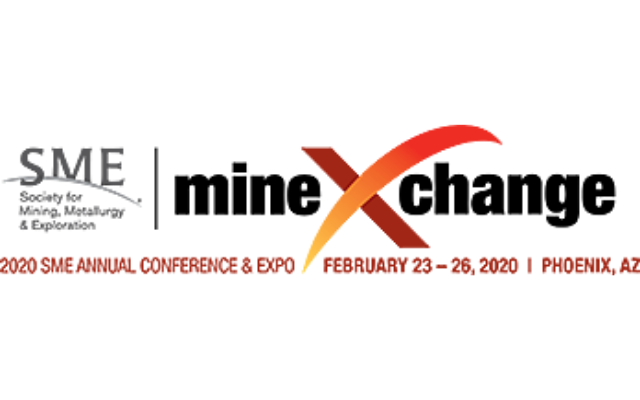
- This event has passed.
Symposia at MineXchange 2020 SME Annual Conference & Expo

Explore topics critical to your business and professional growth through SME Symposia. Designed to fully address issues facing the mining industry, these symposium sessions offer a deeper under understanding of industry developments.
MINE TAILINGS: PERSPECTIVES FOR A CHANGING WORLD
Program chairs: John Lupo, Newmont and Resa Furey, Stantec
Recent tailing dam failures have required the industry to rethink its approach to tailings management and governance. With the release of the 2016 ICMM Position Statement on Preventing Catastrophic Failure of Tailings Storage Facilities, mining companies increasingly focus on accountability, responsibility and competency; planning and resourcing; risk management; change management; emergency preparedness and response; and review and assurance.
Mitigating future failure of tailings dams requires a cultural shift on Tailings Storage Facilities (TSFs) management and governance. This cultural shift calls for education within the industry – and of stakeholders – on the design, operation, construction, operation, and closure of TSFs.
SYMPOSIUM SESSIONS FEATURE FIVE TOPICS:
Tailings Dam Failures – Lessons Learned & Reputational Risk
Session chairs: Kim Morrison, Newmont Goldcorp and Dirk van Zyl, University of British Columbia
The industry record on tailings dam performance, as measured by number of failures, has been generally unchanged over the last 50 years, with an average of about two failures per year. However, there is a disturbing trend of increased severity of the failures, with the majority of failures since 1990 classifying as Serious (i.e., large enough to cause significant impacts or loss of life) or Very Serious (i.e., catastrophic dam failures that released more than one million cubic meters of tailings and, in some instances, resulted in multiple loss of life).
This session will address these important questions, and more:
- Are we, as an industry, heeding the experience gained through these failures, or does history continue to repeat itself?
- Are knowledge gaps, management shortcomings, or poor ethics to blame for the failures?
- What are the repercussions with respect to reputational risk of a tailings dam failure?
State of Practice Session
Session chairs: Georgia Lysay, Freeport-McMoRan and Amanda Adams, Stantec
This session will focus on the technical side and the application of engineering/science to tailings. Presentations will be case studies that address the various disciplines related to tailings: geotechnical, climate/hydrology, hydrogeology, geochemistry, slurry transport. The goal is to highlight specifics about each featured project that could be replicated in other projects to make them “state of the practice”.
Presentations are based per stage in the TSF lifecycle:
- Design
- Construction
- Operations
- Closure
Tailings Governance
Session chairs: Caius Priscu, Anglo American and Harvey McLeod, Klohn Crippen Berger
The goal of the session is to understand various governance systems and their advantages and limitations. Governance is a culture of performance that works throughout the organization with a core value of reducing risk. Governance systems start in the Corporate Office and are, by necessity, a mix of managerial, technical and operational components.
Presentations will include corporate governance models that have been implemented to reduce the risk to owners, shareholders and the public, and technical and operational governance systems/components.
Tailings Continuum – Selection of the Right Tailings Technology
Session chairs: Mike Davies, Teck and Rachel Jansen, Paterson & Cooke
This session’s presentations will show different perspectives and roles within the overall efforts to evaluate, select and then implement the right tailings process technology across the tailings continuum. The panel discussion will look at present, near-term and longer-term projected trends within the continuum and provide all who attend an appreciation that “one size fits all” is not applicable to tailings deposition technologies.
Importance of CULTURE in Safe Tailings Management
Session chairs: Tamara Johndrow, Freeport-McMoRan, and Richard Davidson, AECOM
Review of recent tailings storage facility (TSF) failures indicates a number of them occurred after a history of compounding deficiencies leading to an erosion of resilience in TSF performance. Many of these deficiencies likely occurred without a full understanding of the implications of technical or business decisions on a complex, long-lived facility. Changing conditions are inevitable, so being able effectively predict future system behavior, proactively search for potential challenges or changes, and implement appropriate mitigations is critical.
This session explores the vital role of a company’s safety culture in driving down TSF failures to a goal of zero:
- Culture begins at the very top of an organization. Creating strong safety culture with an environment of responsibility in a collaborative and supportive manner is critical.
- A high level of communication between qualified operational staff, subject matter experts and multi-tiered reviewers helps illuminate potential failure modes and actions required to improve resilience and reduce risk.
- Important traits include securing independent and competent technical and operational assessments, asking engaged questions, making risk-informed decisions considering worst-case failure modes, searching for gaps in understanding / hidden risks and mitigating proactively, and striving for continual improvement.
Presentations will include four case studies, followed by a panel discussion, of human elements involved with the safe design and management of TSFs.
MANAGING GANGUE MINERALS
Program Chair:
Gangue minerals constitute a predominant portion of any ore deposit. Managing gangue minerals comes to play a decisive role for effective mineral processing and extractive metallurgy. Declining ore grades have made this an urgent concern at many mining operations. Experts from industry and academia will share their knowledge on a variety of aspects related to the management of gangue minerals in mineral processing and hydrometallurgical circuits.
This symposium features presentations examining the following technical aspects:
- Pre-concentration of ores to manage problematic gangue
- Managing non-sulfide gangue (NSG) in flotation
- Managing sulfide gangue minerals in flotation
- Managing gangue in hydrometallurgical processes
